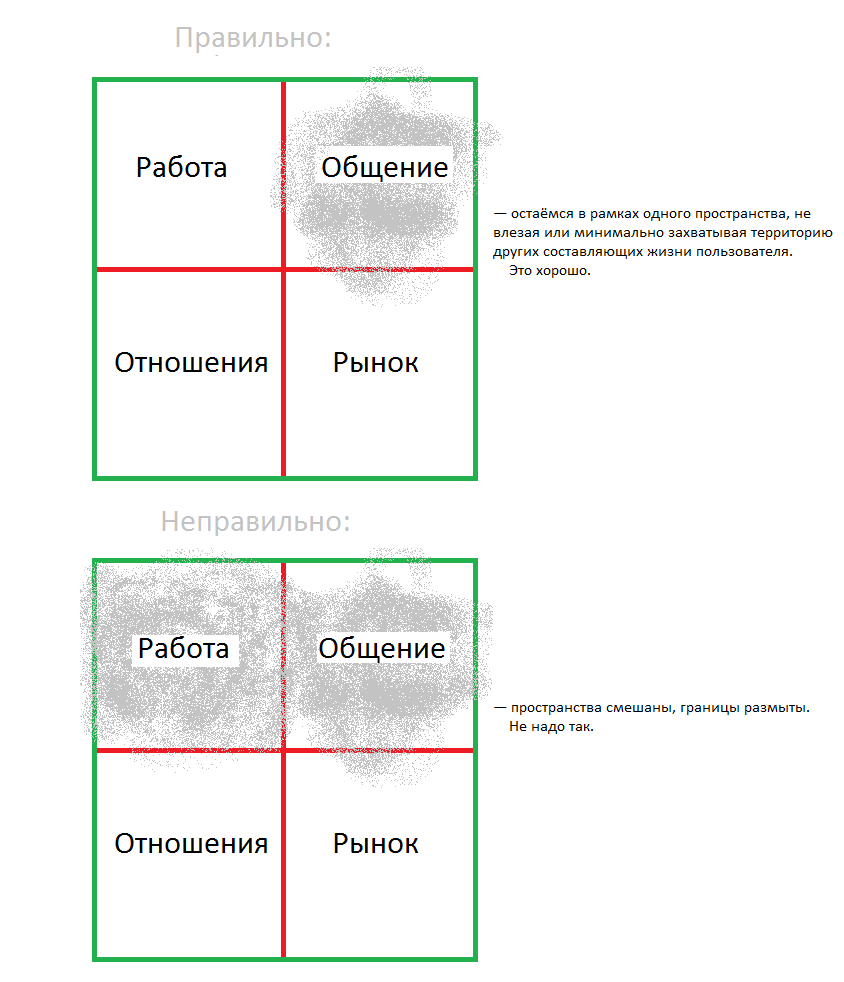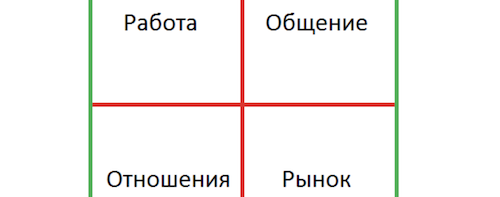Google+ lesson: projects should be monitored so that the boundaries between the interests of users in real life are respected and online
Google has finally followed the advice of every Hollywood drama in which the hero loses a loved one, and let Google+ go .
Paradoxically, Google+ and the other projects mentioned above keeps it on the ground, not letting it take off, it is deep integration with the parent service. Yes, it allows you to pump up traffic and maintain life in the project. But this enters into a deep contradiction with one of the basic principles of human behavior: the desire to divide spaces. Someone separates work from personal life, someone sports from study, someone tries not to mix Internet and offline activity - anyway, for every person there is a concept of what things in his life should exist separately from others. It seems that the creators of social networks have understood this for a long time - and all friends and subscribers can be divided into groups, delimiting access with privacy settings - but is it enough?
The behavior of users on the Internet suggests that in reality they need a deeper distinction.
I would single out four global spaces that a person tries to share in principle in life: this is work, communication, relationships and the market. And by communication, I mean entertainment, including, because most of the entertainment on the Internet is somehow related to communication. Under the relationship - everything related to the intimate and sexual side of life. Under the market - financial affairs: earnings and expenses. I think it’s not necessary to decipher the work. In general, it looks something like this:

Naturally they are transferred to the Internet. In the case of Google+, we have an attempt to combine work and entertainment under one account. Google mail and documents - for business correspondence, as a task manager and account registrations, Google+ - for communicating with people, statuses and pictures with cats. As a result, in the window with a business letter from a client, I see a link to his G + account with cats and photos in shorts from the last vacation. Or rather, I would have seen if everything was as Google had intended. But users vote with their feet: having got G + and putting an avatar, they don’t go further than that, and they put photos in their underpants in other social networks.
Of course, this conditional separation - as in real life. No one, unless he is a spy or a terrorist, will be specifically encrypted so that a colleague from work will not accidentally meet a friend at the university. Just will not meet with them at one time. But finding out who is who will not be difficult. And on the Internet as well - if you really want, then you can always google the right name and find out what comments it leaves under the photos of naked women in Vkontakte. This whole story of the division of spaces rests on the fragile principle of don’t ask - don’t tell, the strength of which is provided for the most part by the mutual apathy of the people to the majority of those around them. But the integration of social networks and workspace (Gmail and G +) destroys this border. What causes most of the subconscious (because I did not see any clear reflections on the topic “So why didn’t take off Google+”) a passive protest. People just do not want.
Developing this hypothesis, I can also assume that an attempt to make, for example, a dating service on the basis of a social network (communication + relationships) or vice versa, will also not take off * . Using the functionality of social networks for dating - ok, the union - for nothing. Or, for example, I can predict the inglorious end of a social network uniting buyers (market + communication), if such a thing arises. Relatively speaking, within the framework of this concept, the project should choose one of the sectors of the square and make sure not to get too far beyond its borders:

Understand me correctly: integration, compatibility of projects is good. But confusion should be avoided. Even if you think that one project can absorb all aspects of human life, a person will never agree with this.
PS After talking in the comments, I realized that this model is quite working, and it has a visible potential for refinement and transformation into a good, practical model. Therefore:
Although I wrote about the de facto Google+ failure four years ago, today's post is notAttempts to collect all the Internet in one site are not new. Practically from the very foundation of the Internet, websites began to appear, trying to collect all the services available at that time in themselves - so to speak, one-window Internet service, or a single point of entry to the network. They were called so: portals - although now this term has already completely eroded.onlyabout “I told you,” but about the idea underlying the post “What's wrong with Google+”. The idea, which, in my opinion, simply did not receive due attention, drowning after holivar.
Now is an excellent, if not the last, opportunity to discuss it essentially, for which I republish the central part of the original publication.Such careful work in Paint should not be lost just like that.
I can already see how someone's indignation is boiling: what impudence and outrageous necro-hosting. Maybe. And maybe not. Because right now, in the autumn of 2018, another forecast from the original publication just became relevant.
So some kind of time test is already passed. There is only one edit so far: the word “theory” has been replaced with a “hypothesis”.
Paradoxically, Google+ and the other projects mentioned above keeps it on the ground, not letting it take off, it is deep integration with the parent service. Yes, it allows you to pump up traffic and maintain life in the project. But this enters into a deep contradiction with one of the basic principles of human behavior: the desire to divide spaces. Someone separates work from personal life, someone sports from study, someone tries not to mix Internet and offline activity - anyway, for every person there is a concept of what things in his life should exist separately from others. It seems that the creators of social networks have understood this for a long time - and all friends and subscribers can be divided into groups, delimiting access with privacy settings - but is it enough?
The behavior of users on the Internet suggests that in reality they need a deeper distinction.
I would single out four global spaces that a person tries to share in principle in life: this is work, communication, relationships and the market. And by communication, I mean entertainment, including, because most of the entertainment on the Internet is somehow related to communication. Under the relationship - everything related to the intimate and sexual side of life. Under the market - financial affairs: earnings and expenses. I think it’s not necessary to decipher the work. In general, it looks something like this:

Naturally they are transferred to the Internet. In the case of Google+, we have an attempt to combine work and entertainment under one account. Google mail and documents - for business correspondence, as a task manager and account registrations, Google+ - for communicating with people, statuses and pictures with cats. As a result, in the window with a business letter from a client, I see a link to his G + account with cats and photos in shorts from the last vacation. Or rather, I would have seen if everything was as Google had intended. But users vote with their feet: having got G + and putting an avatar, they don’t go further than that, and they put photos in their underpants in other social networks.
Of course, this conditional separation - as in real life. No one, unless he is a spy or a terrorist, will be specifically encrypted so that a colleague from work will not accidentally meet a friend at the university. Just will not meet with them at one time. But finding out who is who will not be difficult. And on the Internet as well - if you really want, then you can always google the right name and find out what comments it leaves under the photos of naked women in Vkontakte. This whole story of the division of spaces rests on the fragile principle of don’t ask - don’t tell, the strength of which is provided for the most part by the mutual apathy of the people to the majority of those around them. But the integration of social networks and workspace (Gmail and G +) destroys this border. What causes most of the subconscious (because I did not see any clear reflections on the topic “So why didn’t take off Google+”) a passive protest. People just do not want.
Developing this hypothesis, I can also assume that an attempt to make, for example, a dating service on the basis of a social network (communication + relationships) or vice versa, will also not take off * . Using the functionality of social networks for dating - ok, the union - for nothing. Or, for example, I can predict the inglorious end of a social network uniting buyers (market + communication), if such a thing arises. Relatively speaking, within the framework of this concept, the project should choose one of the sectors of the square and make sure not to get too far beyond its borders:

Understand me correctly: integration, compatibility of projects is good. But confusion should be avoided. Even if you think that one project can absorb all aspects of human life, a person will never agree with this.
* Well, literally the other day, perhaps, the Facebook-announced dating project is already on the notice. I was not interested in them yet, but in general, for these 4 years I have already accumulated personal experience and observations about why the sharing and social networks simply cannot be interfered with.
PS After talking in the comments, I realized that this model is quite working, and it has a visible potential for refinement and transformation into a good, practical model. Therefore:
- I decided to launch a new phase in which I would research and develop a more accurate model based on this idea;
- I will begin this work in the foreseeable future at the earliest opportunity;
- It will help if there is a company that wants to become a sponsor of this development.

